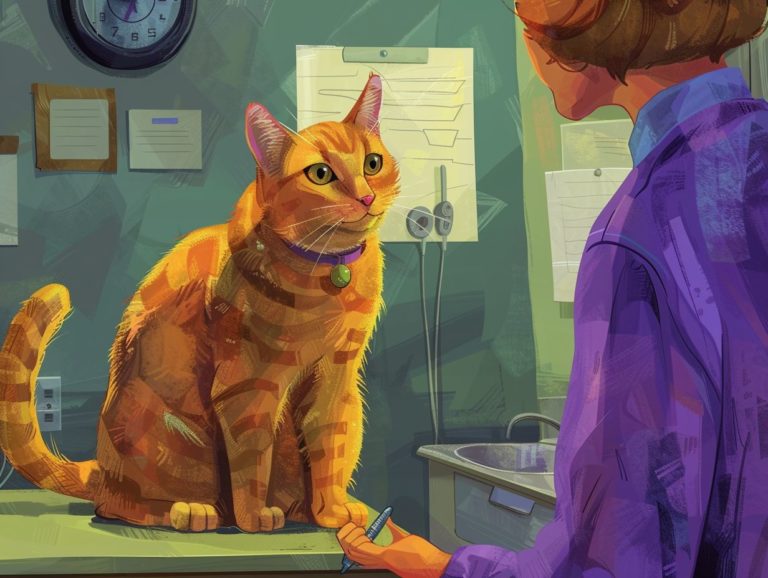Coping With The Loss Of A Pet Does Indoor Cat Insurance Help
This article covers the stages and coping mechanisms of pet loss, the benefits of indoor cat insurance, common health issues and covered treatments, factors to consider before buying indoor cat insurance, alternative ways to prepare for pet-related medical expenses, and support and resources for individuals experiencing the loss of a pet.
Key Takeaways:
The Grieving Process of Losing a Pet
The process of grieving the loss of a pet is deeply emotional for individuals and families who shared a bond filled with love, companionship, and cherished memories. The stages of grief following pet loss encompass a range of emotions including denial, shock, sadness, and eventual acceptance, with individuals progressing through them at varying paces. Coping mechanisms that aid in healing include seeking support from other pet owners who have undergone similar losses, creating a memory box containing items that belonged to the pet, or participating in activities that commemorate the pet’s life.
Reflecting on the special moments shared with the pet can offer comfort during periods of intense grief. Establishing memorials such as planting a tree, crafting a photo collage, or composing a letter to the pet can serve as meaningful ways to honor their life and the positive impact they had.
Emotional Stages and Coping Mechanisms
The emotional stages of pet loss grief can vary from shock and anger to sadness and acceptance, with healthy coping mechanisms and support helping withdividuals as they navigate the grieving process.
The stage of denial is when an individual struggles to accept that their pet is no longer with them and clings to hope for the pet’s return. This phase of disbelief and confusion may fluctuate in and out of the other stages. During this period, they may choose to create a tribute in memory of their loyal companion, such as a photo album or planting a pet memorial tree. Finding solace and empathy by talking to others who have experienced the loss of a pet can be comforting.
Benefits of Indoor Cat Insurance
Indoor cat insurance provides pet owners with peace of mind by offering coverage for common health issues that indoor cats may face. In the modern age, safeguarding the health and well-being of our furry companions is of utmost importance.
While indoor cats are shielded from outdoor hazards within their living environment, they remain vulnerable to various health conditions like urinary tract infections, dental problems, and obesity. Given the rising costs of veterinary care, investing in insurance for your indoor cat can alleviate financial burdens and ensure timely access to necessary medical treatments.
By opting for indoor cat insurance, you can prioritize your cat’s health and make well-informed decisions about their care, free from concerns about unexpected disease or illness expenses.
Coverage for Common Health Issues
Insurance coverage for indoor cats typically includes common illnesses such as urinary tract infections, dental problems, and upper respiratory issues. Regular veterinary care and access to a wide variety of treatments are vital for ensuring the health of indoor cats.
Frequent veterinary check-ups are crucial for early detection and prevention of potential illnesses in indoor cats. Vaccinations, parasite control, and personalized nutritional plans are essential aspects of a comprehensive pet healthcare program.
Pet owners should be knowledgeable about the various resources at their disposal, such as online forums, veterinary hotlines, and pet insurance companies, for obtaining advice and assistance with their cat’s health.
Factors to Consider Before Purchasing Indoor Cat Insurance
When selecting indoor cat insurance, individuals should take into account factors such as the age of their cat, breed predispositions, and any existing medical conditions. Pet owners need to be informed and choose insurance coverage that aligns with their specific requirements.
Another crucial aspect to consider is the range of coverage options offered in various insurance policies. It is essential to have a clear understanding of the services included in each policy, including routine check-ups, vaccinations, emergency care, and specialized treatments. Comparing deductibles, co-pays, and coverage limits is necessary to ensure they are suitable for your budget and needs.
Additionally, the reputation of the insurance company, along with the quality of its customer service and claim process, are important considerations. Remember that timely veterinary care plays a vital role in maintaining the health of your indoor cat. Insurance can offer financial security in case of unforeseen medical emergencies.
Cost and Coverage Comparison
When choosing indoor cat insurance plans, comparing the costs and coverage options is essential for pet owners to determine the most suitable policy for their pets. Understanding the benefits and limitations of each policy ensures that pet owners select the right insurance for their feline companions. Some insurance plans may feature lower premiums but higher deductibles, while others may have higher monthly costs but lower out-of-pocket expenses for vet visits and treatments. Pet owners should evaluate these options based on their budget and readiness to pay in case of an emergency or chronic health issue. Policies that encompass a wide range of covered services, including wellness visits, vaccinations, dental care, and management of chronic illnesses, are generally ideal for maintaining the well-being of cats.
Alternatives to Indoor Cat Insurance
Along with indoor cat insurance, other methods of preparing for pet health expenses include savings funds, wellness plans, and preventive care. Setting up a designated savings account for your pet is a good way to save for unexpected medical costs.
Many veterinarians offer wellness programs that encompass routine check-ups, vaccinations, and preventive treatments, which can lower the likelihood of major health issues and expensive treatments.
Investing in preventive care measures such as proper nutrition, exercise, dental care, and other proactive steps can contribute to the overall health and lifespan of your pet.
Other Ways to Prepare for Pet Health Expenses
Preparing proactively for pet health expenses involves establishing a pet savings account, participating in wellness programs, ensuring regular veterinary examinations, and considering pet insurance. These proactive measures aid in ensuring financial security and ongoing care for pets.
Researching pet insurance policies can help mitigate the impact of unforeseen medical expenses. Maintaining pets’ health and vitality through balanced nutrition and regular exercise can prevent numerous illnesses and lessen the necessity for expensive treatments.
Creating a dedicated budget for pet care and ensuring availability of funds for unexpected expenses are pivotal in successful financial planning for your pet’s requirements.
Coping with the Loss of a Pet: Support and Resources
Seeking support from friends, family, support groups, or mental health professionals can offer comfort and guidance to individuals coping with the loss of a pet. Honoring the memory of a pet through memorials or rituals can also aid in the healing process.
Grief is a natural response to the death of a pet, and each person grieves in their own way. Those struggling with pet loss may find solace in creating a special memorial to celebrate the bond they shared, such as planting a tree or creating a photo montage.
Seeking psychological assistance to navigate the complex emotions that impact one’s ability to cope can provide valuable support. It is important to note that resources are available to help individuals cope with pet loss, including online forums, grief counseling, pet loss support hotlines, and other forms of support.
Seeking Professional Help and Support Groups
Professional help from grief counselors, psychologists, or therapy groups can offer specialized care for individuals experiencing pet loss. Participation in support groups or online communities dedicated to pet bereavement can create a sense of community and understanding during the grieving process. These support groups typically consist of individuals with similar experiences who can relate to the feelings of loss and sadness that come with a pet’s passing. Group members often share stories, memories, and coping strategies to assist individuals in dealing with their grief, reassuring them that they are not alone in their emotions. Involvement in pet loss memorials or rituals can allow pet owners to commemorate the memory of their pets and provide a cathartic outlet for expressing their emotions.
Frequently Asked Questions
What is indoor cat insurance and how does it help with coping with the loss of a pet?
Indoor cat insurance is a type of pet insurance that covers the costs of medical care for cats that live primarily indoors. While it may not prevent the loss of your pet, it can help ease the financial burden of unexpected medical expenses.
Does indoor cat insurance cover the cost of euthanasia?
This depends on the specific insurance policy. Some policies may offer coverage for euthanasia, while others may not. It is important to carefully review your policy or speak with your insurance provider to know what is covered.
Can indoor cat insurance help with grief counseling after the loss of a pet?
No, typically pet insurance does not cover the cost of grief counseling for pet owners. However, some insurance companies may offer additional services or resources to help with coping with the loss of a pet. It is important to check with your insurance provider for more information.
Is there a waiting period for coverage to begin with indoor cat insurance?
Yes, most pet insurance policies have a waiting period before coverage begins. This is to prevent owners from purchasing insurance only when their pet is sick or injured. The length of the waiting period may vary, so be sure to check with your insurance provider.
Can indoor cat insurance help with end-of-life expenses?
Many insurance policies do not cover end-of-life expenses such as burial or cremation. However, some companies may offer optional add-ons or riders that cover these expenses. It is important to review your policy or speak with your insurance provider to see if this is included.
Is indoor cat insurance worth it for pet owners who have lost a pet in the past?
This ultimately depends on your personal preferences and financial situation. While insurance cannot prevent the loss of a pet, it can provide financial assistance for unexpected medical expenses. If you have experienced high veterinary costs in the past, indoor cat insurance may be a good option for you.

